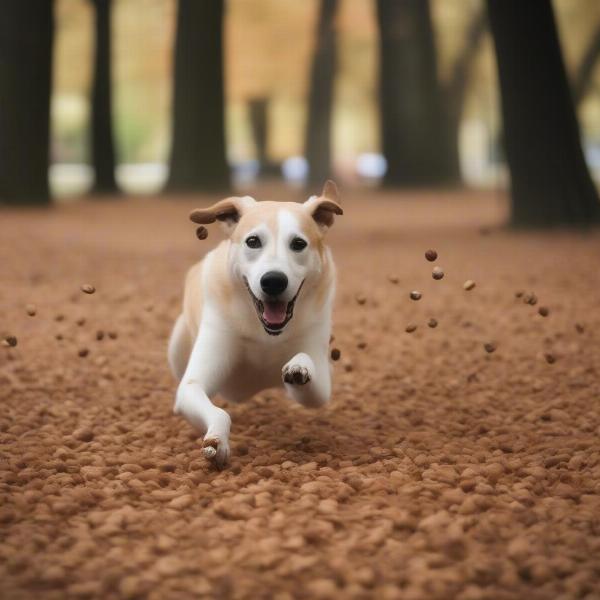Hickory nuts, while a tasty treat for humans, can pose a serious threat to our canine companions. So, are hickory nuts poisonous to dogs? The simple answer is yes. While not as toxic as some other nuts, like macadamia nuts, hickory nuts contain juglone and various toxins that can cause digestive upset and more severe complications in dogs. Knowing the risks associated with hickory nuts and what to do if your dog ingests them is crucial for every dog owner.
Understanding the Risks of Hickory Nuts for Dogs
Hickory nuts present multiple dangers for dogs. They contain juglone, a chemical compound that can cause stomach upset, vomiting, and diarrhea. Additionally, the high fat content in hickory nuts can lead to pancreatitis, a serious and potentially life-threatening inflammation of the pancreas. Finally, the hard shells of hickory nuts can obstruct your dog’s digestive tract, causing blockages that require surgical intervention. These risks apply to all types of hickory nuts, including shagbark, shellbark, and pignut hickories.
Signs and Symptoms of Hickory Nut Poisoning in Dogs
If your dog has ingested hickory nuts, watch for these signs: vomiting, diarrhea, lethargy, loss of appetite, abdominal pain, tremors, and difficulty walking. In severe cases, pancreatitis can cause fever, increased heart rate, and dehydration. If you notice any of these symptoms, contact your veterinarian immediately. Early intervention is critical for a successful recovery.
What to Do if Your Dog Eats Hickory Nuts
If you suspect your dog has eaten hickory nuts, don’t panic. First, try to determine how many nuts they’ve consumed. Then, contact your veterinarian or the ASPCA Animal Poison Control Center immediately. They can advise you on the best course of action based on your dog’s size, breed, and the number of nuts ingested. Do not induce vomiting unless instructed by a professional, as this can sometimes worsen the situation.
Preventing Hickory Nut Ingestion
Prevention is always better than cure. Keep hickory nuts out of your dog’s reach, especially during fall when they are plentiful. When walking your dog, be mindful of fallen nuts on the ground and discourage them from scavenging. Train your dog to “leave it” or “drop it” to help prevent them from picking up potentially harmful items.
 Dog being trained to avoid hickory nuts
Dog being trained to avoid hickory nuts
Conclusion
Hickory nuts are dangerous for dogs and should be avoided at all costs. By understanding the risks, recognizing the symptoms, and taking preventive measures, you can keep your furry friend safe and healthy. If you suspect your dog has ingested hickory nuts, contact your veterinarian immediately.
FAQ
- Are all types of hickory nuts toxic to dogs? Yes, all hickory nuts, including shagbark, shellbark, and pignut, are potentially harmful to dogs.
- What is the most dangerous aspect of hickory nuts for dogs? The potential for intestinal blockage, pancreatitis, and toxicity from juglone are all significant concerns.
- Can dogs eat small amounts of hickory nuts? No, even small amounts of hickory nuts can cause digestive upset and other problems.
- How long after eating a hickory nut will a dog show symptoms? Symptoms can appear within a few hours or may be delayed for a day or two.
- What should I do if my dog ate a hickory nut a few days ago and is now showing symptoms? Contact your veterinarian immediately, even if the ingestion occurred several days prior.
- Are there any home remedies for hickory nut poisoning in dogs? No, do not attempt to treat your dog at home. Seek professional veterinary care.
- How can I prevent my dog from eating hickory nuts in my yard? Regularly rake and clean up fallen nuts, and supervise your dog closely when they are outside.
ILM Dog is your trusted resource for expert advice on dog care and wellbeing. We offer guidance on everything from breed selection and training to nutrition and health. Our team of experienced professionals is dedicated to helping you provide the best possible care for your canine companion. For expert advice tailored to your dog’s individual needs, contact us today! Email: [email protected] Phone: +44 20-3965-8624. Visit ILM Dog for more information.